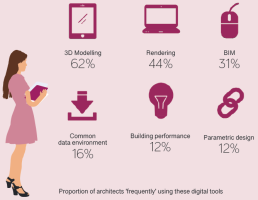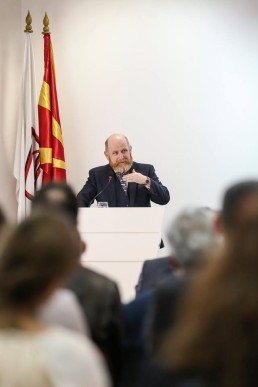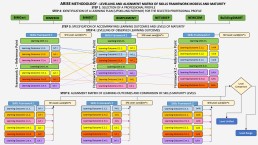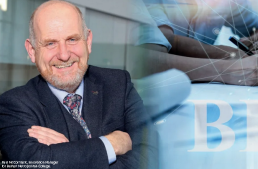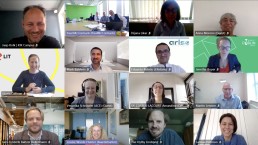Digitalisation: what is changing for architects?
An interview with Veronika Schröpfer, Head of EU Research Projects at the Architects’ Council of Europe
>> Digitalisation is changing the work of architects around the globe. At the moment there are around 560.000 architect in Europe, most of these working alone or in small offices. SMEs have the advantage to be quicker to adapt to new technologies and tools. Architects have shown themselves to be extremely willing to learn, more than half of those using each tool are self-taught. Architects are much more likely to use new tools out of personal or business interest than due to client or regulatory requirements. This shows that architects are enthusiastic to adopt digitalisation tools.
The role of the development of digital competences in the building domain
>> Architects contribute around 17 billion Euros to the EU economy (ACE, sector study 2020). Nevertheless, ACE has advocated for more diversity in software and tool providers. Annual licence fees for software can be a barrier for micro sized architecture practices. They cannot afford various licences for similar tools but different providers depending on the project. Hence the interoperability of tools and platforms are vital.
>> You can see in our 2020 ACE sector study, that there has been a proliferation of new digital tools which the architectural profession is adopting. A majority of architects use 3D modelling tools ‘frequently’, and nearly half use rendering tools frequently. About one in three architects frequently use BIM on their projects. An important aspect is that most architects use the tools out of their own choice.
The impact of putting in place a recognition system valid at European level
>> Our 2020 ACE Sector Study has revealed that the vast majority of architects taught themselves how to use digital tools.
No more than 35 per cent received formal training for any of the tools, although more received informal training. On average architects spend about 20 hours of official Continuing Professional Development (CPD) per year. CPD is a structured way of maintaining and developing the competence as a qualified professional by engaging in regular learning activities. For a training recognised and valid at EU level it should be endorsed by ACE Member Organisations in various EU Member States and meet the minimum agreed European quality standards. Various European training bodies should recognise each other’s CPD, making it easier for architects to work in the countries they choose. Usually, one learning hour equals one international CPD credit. Therefore, we joined the ARISE project, as it will work on the recognition of the CPD competences through the development of a platform based on microunits certified with blockchain.
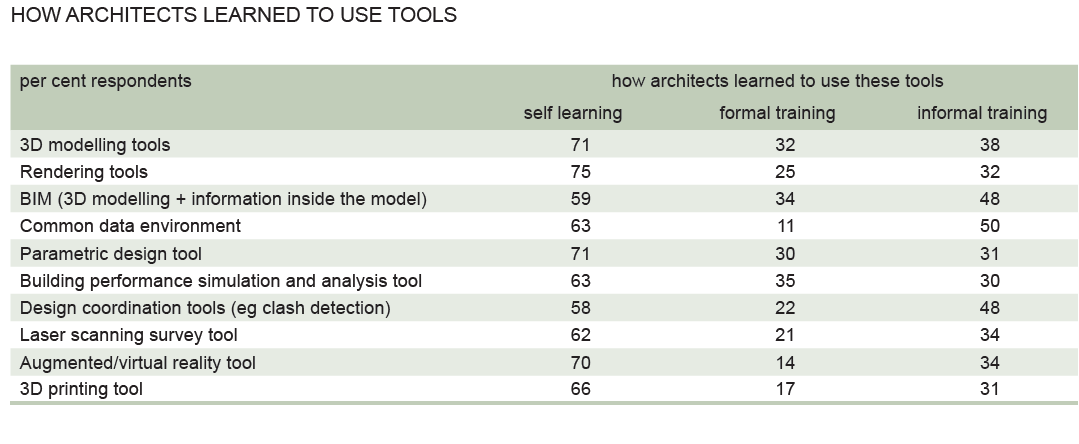
Dr. Veronika Schröpfer, Head of EU Research Projects at the Architects’ Council of Europe
Images and sources of numbers from the ACE Sector Study: https://www.ace-cae.eu/fileadmin/user_upload/2020ACESECTORSTUDY.pdf
The benefits of a digitally informed and empowered workforce article
ARISE Programme Manager Paul Mc Cormack has had his 5th article published in a series of 6 for the Dublin magazine, Building Services Engineering. The article by Paul titled, 'The benefits of a digitally informed and empowered workforce' is on pages 10 and 11 of the January 2022 issue. You can read it here : https://issuu.com/patlehane/docs/building_services_engineering_jan_feb_2022_web_fil?fr=sYWRiNjcyNDY0
Desk research on maturity analysis of digitalisation and sustainable energy skills
The ARISE team is carrying out Desk research on maturity analysis of digitalisation and sustainable energy skills.
The research is led by IECE on models of digital and energy skills frameworks and maturity levels, and developed by several H2020 and Erasmus+ funded projects and international brands (bSI).
The comparative study will include multi-criteria evaluation of skills and qualifications frameworks, identifying the level of compliance and complementarity and specifying similarities and differences thereof, as a specific proof of the ARISE concept of international transact-ability of learning achievements and competencies. One of the study outputs will be a novel model of levelling and alignment matrix developed by the learning outcomes based methodological approach and tested within the team, on several selected professional profiles. In further steps, it will be aligned with the UNESCO and CEDEFOP methodology (2017) by considering NQF as a reference point, and suggested as a sectoral methodology of comparison, alignment and transfer of qualifications.
The report will be published in early Spring 2022.
Access the link below for more information:
https://www.ariseproject.eu/netherlands/reports/
New Guideline on the use of BIM for energy performance
The current global warming trend is greater than the 1.5 degrees value established during the Paris climate change summit. World leaders reiterated the need to halve emissions over the next decade and reach net zero carbon emissions by mid-century to limit global temperature rise to 1.5 degrees.
The result of this policy is leading to the construction of new buildings with very high performance, but there is a strong need to improve the energy performance of the existing building stock.
Integrating BIM into national climate-change and energy policies is necessary and challenging, as many of these buildings lack reliable information, which BIM can help generate, exchange and, most importantly, archive so that they can be used in the future regardless of the software that generated them. The use of open standards is therefore not an option but an obligation.
The working group on energy efficiency active within IBIMI (Institute for BIM Italy), the Italian chapter of buildingSMART International, worked on the drafting of guidelines on how BIM can contribute to improving energy performance in each phase of the life cycle of a building
The guidelines can be downloaded free of charge from the websitewww.buildingsmartitalia.organd will be used as Body of Knowledge for buildingSMART International Qualification Program on Energy Performance.
We would be grateful if you take a few minutes to answer to a survey on the use of BIM to improve the energy performance of buildings. This will help us to draw the roadmap on the competences needs. At this link the survey:https://docs.google.com/forms/d/e/1FAIpQLScaXQ5eD_FI7AUcs0_C0v3DcdgH5_XDSNMZbVS2vEoju_ixZg/viewform
The need for upskilling within the industry - NI Builder Magazine article
Find NI Builder Magazine article: “The Need for Upskilling within the Industry” in the last page of the magazine: https://online.flippingbook.com/view/816902763/98/
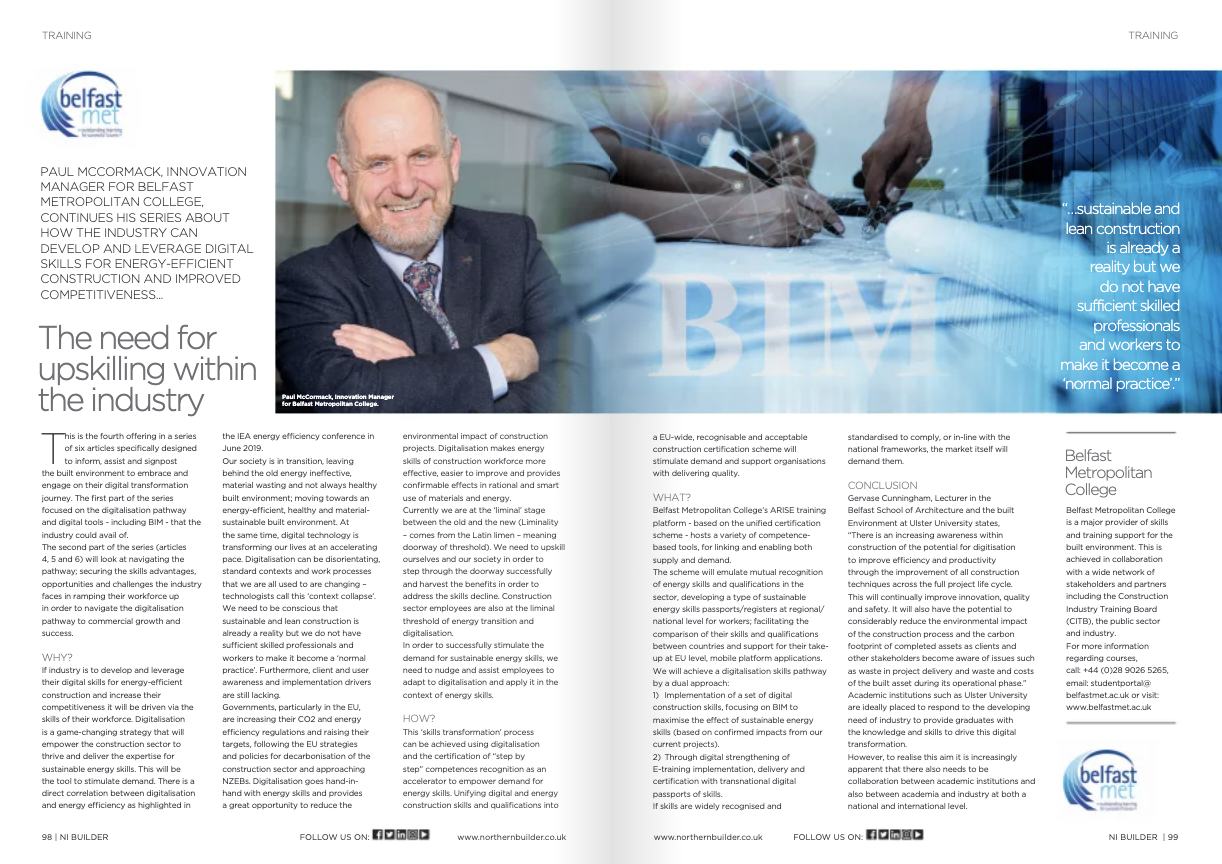
Digital Transformations - building services engineering article
Find the full article on the building services engineering website.
If industry is to develop and leverage its digital skills for energy efficient construction, and increase its competitiveness, it will be driven via the skills of the workforce. Upskilling must be demand-driven, demand both from the industry perspective and from the workers in the industry. It is this “meeting of demands” that will lead to success in meeting the needs of industry, society and the environment.
Digital transformation is a topical subject for all of industry and is seen as a key organisational strategy to support sustainable growth, especially in industries such as construction which is seen as a technology laggard. BIM is recognised as one of the main digital tools that are critical enablers that can embed digital processes within organisations. Specifically, the information management processes within BIM help companies in transforming traditional information processes and turning the information into data that is easier handled, used and analysed.
ARISE Launch
Belfast Metropolitan College launched their new £1.12 million European digital construction project, ‘ARISE’ in the 2 days KICK OFF meeting 1st and 2nd September 2021.
ARISE aims to revolutionise the learning process by changing the face of delivery and recognition of sustainable energy skills in the building sector.
ARISE’s mission is to support the twin transition of the design and construction sector and to contribute thereby to the European Recovery and Resilience Plans 2021 -2027, by providing the building sector professionals with digital and sustainable energy skills of the future, along with demand-side guidelines for marketable appreciation of skills and exploitation of benefits thereof.
The nine partners in the project consortium are:
- Belfast Metropolitan College, Northern Ireland
- Technological University Dublin, Ireland
- Institute for Research in Environment, Civil Engineering and Energy, North Macedonia
- ISSO, Netherlands
- Architects’ Council of Europe, Belgium
- IBIMI Institute for BIM, Italy
- Building Changes, BV, Netherlands
- Copenhagen School of Design and Technology, Denmark
- Instituto Superior Technico, Portugal.
On the opening launch day on Wednesday, September 1, Belfast Met Innovation Manager and ARISE Programme Manager, Paul McCormack gave an introduction and outlined the challenges and objectives for the 30-month programme.
Louise Warde Hunter, Principal and Chief Executive of Belfast Met also addressed the opening day audience with: “Today’s ARISE launch reinforces Belfast Met’s commitment to engage in international partnerships and applied Research & Development, working in innovative ways with industry to meet the emerging skills needs of the economy at home and abroad. “
“Our People, our Planet, and our Partnerships are key to addressing the interconnected challenges of sustainability at TU Dublin. The ARISE project creates a positive impact by addressing real-world challenges in the construction sector through the upskilling of individuals to reach their infinite potential. ARISE leverages learning post-Covid, by offering bite-size educational units through a digital mobile curriculum to enable learning opportunities that are accessible and sustainable in our daily lives.” Stated Ms Jennifer Boyer, Vice President of Sustainability, Technological University Dublin, one of the nine European partners on the project, which has Belfast Met as the lead partner.
The funding for the project was gained through the EU Horizon 2020 Work Programme. Ms Amadine De Coster-Lacourt, Project Advisor, (CINEA), European Climate, Infrastructure and Environment Executive Agency, highlighted that: “ARISE will contribute to the Green Deal and the Renovation Wave objectives by facilitating recognition of sustainable energy skills in the built environment and increasing demand for those skills”.
The distinct work packages work to be carried out by the partners were discussed and detailed Work Packages.
- WP1 MANAGE Belfast Met
- WP2 BENCHMARK energy & digitalisation skills IBIMI - Italy
- WP3 DESIGN framework ISSO The Netherlands
- WP4 DEVELOP autonomy e-engine KEA - Denmark
- WP5 FILL agility e-tools TU Dublin
- WP6 PILOT Digital Pathway energise Belfast Met
- WP7 REPLICATE market implementation IECE Macedonia
- WP8 COMMUNICATE dissemination & exploitation ACE Belgium
Martin Lennon, Director, (OHMG), O Hare McGovern stated: “The early involvement of OHMG with (previous project) BIMcert was the platform that escalated our BIM journey, ensuring we remained at the forefront of digital innovation.
“ We are delighted to once again join with BMET and their international partners, at the start of their ARISE project journey. The result of this partnership will ensure OHMG have a skilled workforce who will have the knowledge, experience and competencies to deliver on the Government’s Construction 2025: Strategy”.
Mark Baldwin, Building Smart International, in Switzerland added: “Competency assurance is a significant aspect contributing to the success and sustainability of the digitalization of the built asset industry.”
ARISE will revolutionise the learning process by monetizing skills development and learning exchange with a digital system based on skills recognition rather than accreditation. The training and transaction system developed by the project will reward learners as they achieve competence at a certain level with the cryptocurrency for skills exchange - CERTcoin – the innovative currency of skills and learning of the design and construction sector embracing today’s digital transformation benefits. This reward-based on skills and time credits will be stored in an Individual Learning Account and can be used as digital points accumulation for example in a skills barometer or for exchanging it into valid certificates. It will be an easier accessible, less time consuming and still competitive way to up-skill design and construction professionals and workers, as well as market demand side – public administration, clients and owners.
ARISE will apply digitalisation both as a learning method and as a framework of job-based construction skills of the future, multiplying the effects of the green transition skills. The novel training method will make the learning process attractive and effective, facilitating its accessibility through a mobile (smartphone) and a user-friendly web-based platform. The intervention/learning progress will be achieved in a scalable way, in bite-sized skills delivery. ARISE will apply digitalisation and the earning of learning credits in a "step by step" recognition of competencies, as an accelerator to empower demand for sustainable energy skills in the desing and construction sector, and as an enabler of formal certification. This system will be employed based on blockchain procedures to instil transparency and trust.
Within 30 months, until February 2024, partners will work on the development and demonstration of the innovative on-demand training scheme for digitalisation towards sustainable energy skills, aimed at both supply and demand sides.
Revolutionising the learning process by changing the face of delivery and recognition of sustainable energy skills in the construction sector
That’s the target for the ARISE project team as they seek to deliver their new EU wide skills and training project, boosting thereby market uptake of qualified workforce.
ARISE has secured a €1.12M grant from the Horizon 2020 Work Program: Building a Low-Carbon, Climate Resilient Future: Secure, Clean and Efficient Energy, under the Call: Increasing Market Demand for Sustainable Energy Skills in the Building Sector.
ARISE’s mission is to support the twin transition of the construction sector and to contribute thereby to the European Recovery and Resilience Plans 2021-2027, by providing the construction sector workforce with digital and sustainable energy skills of the future, along with demand-side guidelines for marketable appreciation of skills and exploitation of benefits thereof.
Through a highly innovative approach, ARISE will deploy a system coupling methodology and approach, and encompassing:
1) Skills delivery method;
2) Learning accounts transaction and recognition;
3) Matrix of skills maturity, leading to new qualifications and jobs;
4) Profession–based learning content;
5) Impacts of skills on buildings’ energy performance;
6) New market and regulatory models of skills demand; and
7) Stimulation of investments in high energy performance buildings.
Engaged in the project demonstration stage, over 1000 stakeholders across Europe will improve their skills and competences, providing therefore project induced impact of over 4.5 million kWh/year of energy savings, 2.25 million kWh/ year of RES energy generation, reduction of GHG emissions by over 3.5 tons/year and initiation of 1.3 million EUR/year of investments in NZEBs. As a long–term cumulative impact, ARISE aims to contribute by over 75 million kWh of clean energy use in buildings and over 8,7 million EUR of green investments.
ARISE will revolutionise the learning process by monetising skills development and learning exchange with a digital system based on skills recognition rather than accreditation. The training and transaction system developed by the project will reward learners as they achieve competence at a certain level with the crypto currency for skills exchange: CERTcoin, the innovative currency of skills and learning of the construction sector embracing today’s digital transformation benefits. The learners’ CERTcoins, based on skills and time credits will be stored in an Individual Learning Account and can be used as digital points accumulation for example in a skills barometer or for exchanging it into valid certificates. It will be an easier accessible, less time consuming and still competitive way to upskill blue and white collars, as well as market-demand side, public administration, clients and owners
ARISE will apply digitalisation both as a learning method and as a framework of job-based construction skills of the future, multiplying the effects of the green transition skills. The novel training method will make the learning process attractive and effective, facilitating its accessibility through a mobile (smartphone) and a user–friendly, web-based platform. The intervention / learning progress will be achieved in a scalable way, in bite-sized skills delivery. ARISE will apply digitalisation and the earning of learning credits in a "step by step" recognition of competences, as an accelerator to empower demand for sustainable energy skills in the construction sector, and as an enabler of formal certification. This system will be employed based on blockchain procedures to instil transparency and trust.
ARISE utilises a circular economy approach specifically utilising digital skills stimulation and delivery across the entire building life cycle and assets to decarbonise the complete energy cycle. This approach harnesses the market drivers from the demand side and matches these with impact targeted strategies and objectives required to achieve comprehensive success. ARISE represents a multi faceted approach to tackle the carbon footprint of the construction sector. It is a pioneering training scheme AND a powerful socio - economic cross sectional influencer, affecting the multiple sectors of education, industry, market, and policy by delivering a dynamic training and market uptake model
The project led by Belfast Metropolitan College with eight other European partners will be launched in September 2021. Within 28 months, until December 2023, partners will work on development and demonstration of the innovative on demand training scheme for digitalisation towards sustainable energy skills, aimed at both supply and demand side.
The nine partners in the project consortium are:
- Belfast Metropolitan College, Northern Ireland
- Technological University Dublin, Ireland
- Institute for Research in Environment, Civil Engineering and Energy, North Macedonia
- ISSO, The Netherlands
- Conseil des Architectes D Europe Brussels
- IBIMI Institute for BIM- Italy
- Building Changes, B.V. The Netherlands
- Copenhagen School of Design and Technology Denmark
- Instituto Superior Technico, Portugal
